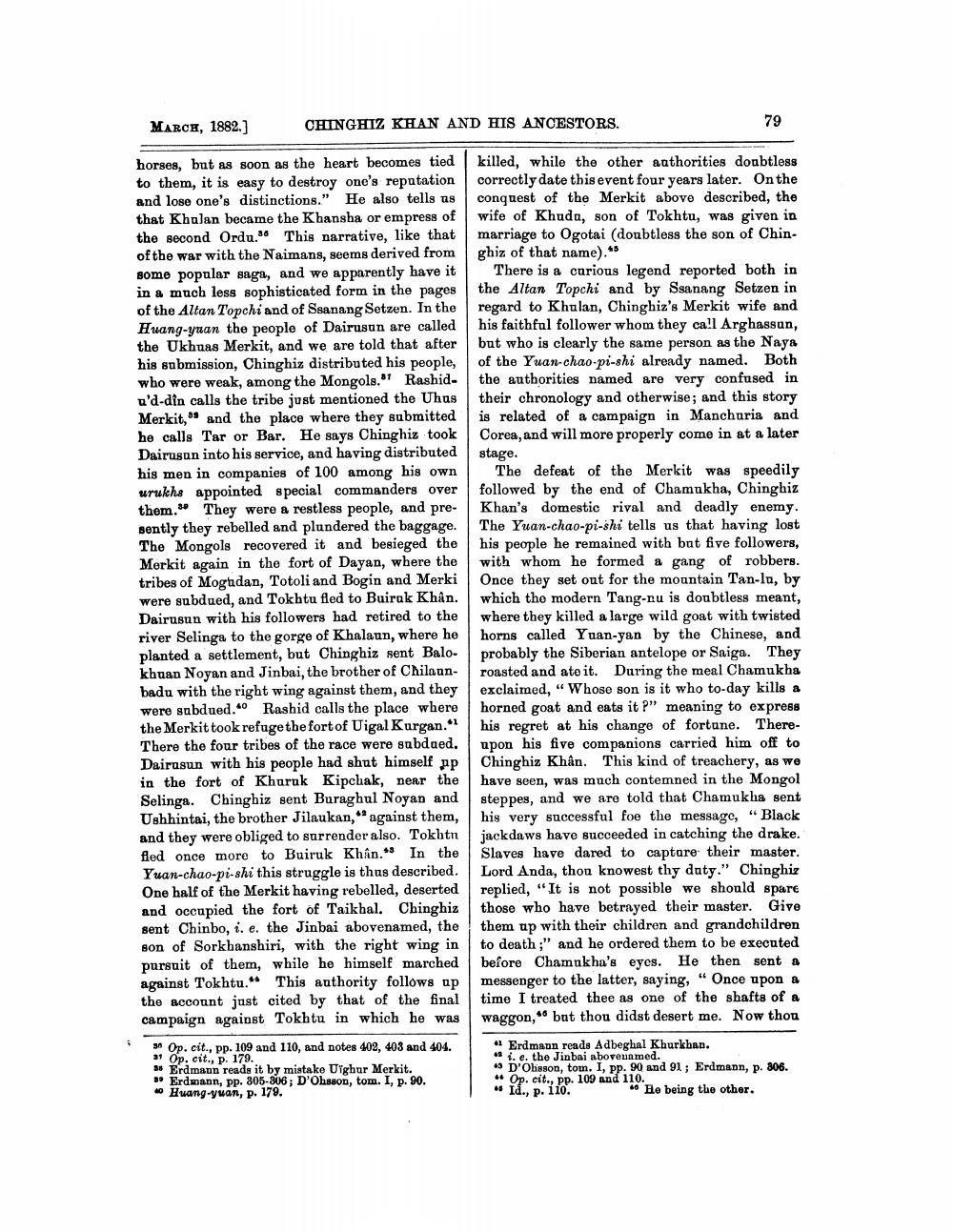________________
MARCH, 1882.]
CHINGHIZ KHAN AND HIS ANCESTORS.
79
horses, but as soon as the heart becomes tied to them, it is easy to destroy one's reputation and lose one's distinctions." He also tells us that Khulan became the Khansha or empress of the second Ordu." This narrative, like that of the war with the Naimans, seems derived from some popular saga, and we apparently have it in a much less sophisticated form in the pages of the Altan Topchi and of Ssanang Setzen. In the Huang-yuan the people of Dairusun are called the Ukhuas Merkit, and we are told that after his submission, Chinghiz distributed his people, who were weak, among the Mongols.' Rashid u'd-din calls the tribe just mentioned the Uhus Merkit," and the place where they submitted he calls Tar or Bar. He says Chinghiz took Dairusun into his service, and having distributed his men in companies of 100 among his own urukhe appointed special commanders over them. They were a restless people, and presently they rebelled and plundered the baggage. The Mongols recovered it and besieged the Merkit again in the fort of Dayan, where the tribes of Mogudan, Totoli and Bogin and Merki were subdued, and Tokhtu fled to Buirak Khân. Dairusun with his followers had retired to the river Selinga to the gorge of Khalaun, where he planted a settlement, but Chinghiz sent Balokhuan Noyan and Jinbai, the brother of Chilaanbadu with the right wing against them, and they were subdued.“ Rashid calls the place where the Merkit took refuge the fort of Uigal Kurgan." There the four tribes of the race were subdued. Dairusun with his people had shut himself pp in the fort of Khuruk Kipchak, near the Selinga. Chinghiz sent Buraghul Noyan and Ushhintai, the brother Jilaukan," against them, and they were obliged to surrender also. Tokhtn fled once more to Buiruk Khîn. In the Yuan-chao-pi-shi this struggle is thus described. One half of the Merkit having rebelled, deserted and occupied the fort of Taikhal. Chinghiz sent Chinbo, i.e. the Jinbai abovenamed, the son of Sorkhanshiri, with the right wing in pursuit of them, while he himself marched against Tokhtu." This authority follows up the account just cited by that of the final campaign against Tokhtu in which he was
killed, while the other anthorities doubtless correctly date this event four years later. On the conquest of the Merkit above described, the wife of Khuda, son of Tokhtu, was given in marriage to Ogotai (doubtless the son of Chinghiz of that name).""
There is a curious legend reported both in the Altan Topchi and by Ssanang Setzen in regard to Khulan, Chinghiz's Merkit wife and his faithful follower whom they call Arghassun, but who is clearly the same person as the Naya of the Yuan-chao-pi-shi already named. Both the authorities named are very confused in their chronology and otherwise; and this story is related of a campaign in Manchuria and Corea, and will more properly come in at a later stage.
The defeat of the Merkit was speedily followed by the end of Chamukha, Chinghiz Khan's domestic rival and deadly enemy. The Yuan-chao-pi-shi tells us that having lost his people he remained with but five followers, with whom he formed a gang of robbers. Once they set out for the mountain Tan-lu, by which the modern Tang-nu is doubtless meant, where they killed a large wild goat with twisted horns called Yuan-yan by the Chinese, and probably the Siberian antelope or Saiga. They roasted and ate it. During the meal Chamukha exclaimed, “Whose son is it who to-day kills a horned goat and eats it p" meaning to express his regret at his change of fortune. Thereupon his five companions carried him off to Chinghiz Khân. This kind of treachery, as we have seen, was much contemned in the Mongol steppes, and we are told that Chamukha sent his very successful foe the message, Black jackdaws have succeeded in catching the drake. Slaves have dared to capture their master. Lord Anda, thou knowest thy duty." Chinghiz replied, "It is not possible we should spare those who have betrayed their master. Give them up with their children and grandchildren to death ;" and he ordered them to be executed before Chamukha's eyes. He then sent a messenger to the latter, saying, “Once upon a time I treated thee as one of the shafts of a waggon, but thou didst desert me. Now thou
31 Op. cit., pp. 109 and 110, and notes 402, 403 and 404. 31 Op. cit., p. 179. S6 Erdmann reads it by mistake Uighur Merkit. * Erdmann, pp. 305-306; D'Ohsson, tom. I, p. 90. 40 Huang-yuan, p. 179.
# Erdmann reads Adbeghal Khurkhan. " i. e. the Jinbai abovenamed. * D'Ohsson, tom. I, pp. 90 and 91; Erdmann, p. 806. * Op. cit., pp. 109 and 110. * Id., p. 110.
Ho being the other.




